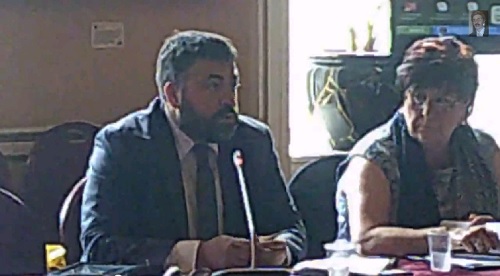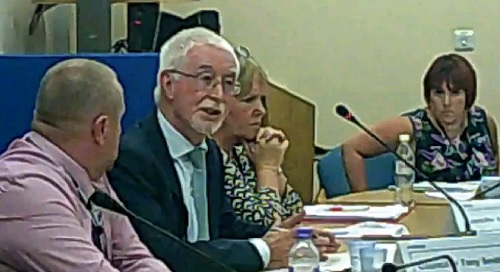Filming public meetings on Merseyside (Open Democracy – Phase 2) Fire Authority is best, Liverpool Council is worst

Since the law changed on filming public meetings on the 6th August 2014 as part of our “Open Democracy” project, I have filmed a number of public meetings of various public bodies on Merseyside to try to get a better understanding of differences in cultural approaches towards the issue.
Here is the list of public bodies I filmed meetings of:
Metropolitan Borough of Wirral (Wirral Council)
Merseyside Fire and Rescue Authority
Liverpool City Region Combined Authority (Merseytravel Committee)
Liverpool City Council
Note: the Merseyside Police and Crime Panel whose host authority is Knowsley Metropolitan Borough Council was originally on this list but dropped due to changes to shift patterns due to a special meeting on the same evening.
I now have a better understanding of what makes up both best practice both for these public bodies and the media.
I could give a detailed score for each but these are all based on a particular public meeting for each public body. However I will briefly detail below what was the best and what was the worst and explain why.
Mersey Fire and Rescue Authority (the best)
This was a meeting of their Consultation and Negotiation Sub-committee held on the 2nd September 2014 starting at 1pm.
Out of the five different public bodies, in my opinion it is this one that went the best, despite a technical problem with our camera which meant filming had to be done in VGA and not HD.
Each councillor on the Merseyside Fire and Rescue Authority, fire officers and union representative had individual microphones that were tested before the meeting started. Agendas/reports were provided (on request) before the meeting started so that the press/public could follow the meeting. Agendas and reports are also available electronically through the Modgov iPad app. Councillors (and others speaking) knew how to use the microphones. Although some people arrived late, this could be because the room the meeting was held in was changed at short notice.
The receptionist was professional and the organisation itself came across as well run. The atmosphere both before, during and after the meeting was pleasant and friendly. The issue under discussion (industrial relations between the Merseyside Fire and Rescue Service and the unions) was one that attracted great public interest and much interest when published.
The room the meeting was held in was well-lit and despite being held on the first floor had a working lift. I have no criticisms of the staff but only compliments.
Footage from this meeting can be viewed below.
Please accept YouTube cookies to play this video. By accepting you will be accessing content from YouTube, a service provided by an external third party.
If you accept this notice, your choice will be saved and the page will refresh.
Merseytravel Committee (part of the Liverpool City Region Combined Authority)
This was a meeting of the Merseytravel Committee held on the 4th September 2014 at 2.30pm. Each councillor and officer had and used microphones (a plus). Atmosphere was pleasant and friendly. The filming location was good as there was light from the nearby window. We were granted access to the room in plenty of time to set up a tripod and camera.
However the meeting room itself seemed dark due to shades put across some of the windows and at times those speaking didn’t always correctly use their microphones. Due to the design and layout of the room, the spot where the public sit is suboptimal for filming from a sitting position due to sight lines (although filming from a standing position would have overcome some of these difficulties). Meeting was not available on Modgov iPad app. Agendas/reports were provided on request.
Footage of this meeting can be viewed below.
Please accept YouTube cookies to play this video. By accepting you will be accessing content from YouTube, a service provided by an external third party.
If you accept this notice, your choice will be saved and the page will refresh.
Wirral Council
This was a meeting of the Wallasey Constituency Committee Working Group held on the 6th August 2014 scheduled to start at 6.00pm. Microphones were not provided for this meeting. Access to the room was provided in advance of the meeting for setting up camera and tripod. Meeting was at times hard to follow, however filming location was optimal.
Background noise from an outside car park, noise from shipping from the nearby River Mersey and other types of background noise including from a tea/coffee machine in the room itself sometimes drowned out what was being said.
There were times when there was crosstalk during the meeting and unusually the meeting started without a Chair. Meeting was available on Modgov iPad app.
Footage of this meeting can be viewed below.
Please accept YouTube cookies to play this video. By accepting you will be accessing content from YouTube, a service provided by an external third party.
If you accept this notice, your choice will be saved and the page will refresh.
Liverpool City Council (the worst)
This was a meeting of the Constitutional Issues Committee starting at 3.00pm on Monday 8th September in the West Reception Room, 1st floor, Liverpool Town Hall, Liverpool.
Upon arrival we were questioned by a private security guard working for a private security firm contracted by Liverpool City Council as to our purpose for being there. She summoned a junior Liverpool City Council employee.
The junior employee had to get his line manager to deal with our query causing a further delay as his line manager was not immediately available.
His line manager said that filming wouldn’t be allowed in the building as he hadn’t received “instructions” and referred to a “bylaw” (on latter reflection it seems this was actually a reference to an unchanged part of Liverpool City Council’s constitution which is not a bylaw but should’ve been changed by Liverpool City Council before the regulations coming into force on August 6th 2014). He insisted that permission was still required. Access to the meeting room before the meeting to set up a tripod and camera was originally denied by building staff line management.
During the conversations with these two people I asked if Liverpool City councillors would be stopped from proceeding to the meeting room upstairs before the meeting started at 3pm and was told they wouldn’t be as they were “regular visitors” to the Town Hall.
I was also told rather curiously that if they allowed filming in Liverpool Town Hall it would open up the prospect of people filming at swimming pools. If anybody could give me an example of a public meeting of a local council held at a swimming pool please leave a comment!
The issue of mobile phones was also brought up with me in a long explanation in the context of filming/recording. This was a rather long and curious explanation to say to somebody that doesn’t own a mobile phone though and had no mobile phone on him. The building staff manager explained that mobile phones couldn’t be confiscated as they were “private property” which is a bit of a moot point if you don’t have one!
A further conversation was had later between myself and the junior employee about how this was at odds with the documentation for the meeting (see page 1 “This is a legal duty for the Council to follow the new provisions” and page 2 “The Councils [sic] is required to provide “reasonable facilities” to facilitate reporting.”) and accompanying appendix 2 “In line with national legislation, the filming and recording of public meetings is permitted.”
He requested his line manager (again) but there appears to have been somewhat of a misunderstanding over the junior employee’s reply to this.
Another conversation was had with the line manager and reference was made to the reports and agenda for the meeting (which ironically was discussing the filming issue and change to the legislation). We found out later during the public meeting that Liverpool City Council had been allowing filming at its meetings for over a month yet nobody had told this building manager it seems!
The response then was (in a stark example of silo mentality at a local council) that these reports were the responsibility of another part of Liverpool City Council “Committee Services”, who had only booked the room in the Town Hall and not staff such as himself who were managing the building (referred to as an “important building” by the person he line managed) where the room was being held.
I then gave much explanation about regulations, House of Commons, House of Lords, how laws were made and how Liverpool City Council had to comply with its legal obligations whatever its constitution stated in a level of excruciating detail I have never had to do before or since.
Eventually the position somewhat changed and we were escorted by the line manager to the room where the meeting was held in advance of it starting at 3pm. We were directed to a spot to film from (the only time out of this series of meetings this happened) and told if it was good enough for ITV Granada (who had according to a plaque on the way in had been awarded Freedom of Entry by Liverpool City Council) then it should be good enough for us. A socket was provided for electricity, but not required as we use batteries.
However when the meeting was held filming from this spot involved filming straight into direct sunlight due to the west-facing windows on the other side of the room (therefore from a technical perspective unprofessional and problematic). Filming from this spot into direct sunlight also caused our batteries to run out six times faster than usual. After the friction earlier, we frankly didn’t have the will left to quibble over what location we filmed the meeting from and although an alternative location was suggested, this was ruled out by us on access grounds (which as one of the councillors arrived in a wheelchair we were proved right).
Before the meeting started there was a loud noise of sawing from outside the room which thankfully stopped by the time the meeting started but was somewhat unnerving.
We were put in an alcove of the room, which affected sound quality. Sound quality during the meeting itself was also affected by background noise from other parts of the building as a nearby door was left open (later shut during the meeting).
An agenda and reports for the meeting were requested (they have a legal duty to supply them) but we were told that there were no copies for the public, but that if a councillor didn’t turn up we could have the copy (which did happen a few minutes before the meeting started which gives little time to read it in detail).
Although some councillors used their microphones correctly during the meeting itself, others did not. One councillor arrived approximately half an hour late.
WiFi was available, but not known about in advance. Although a plus, during the meeting itself, this was referred to as a negative by a councillor who felt that the use of mobile phones or tablets during public meetings by officers and councillors was unprofessional and disrespectful to the meeting as it gave the public and press the impression that they weren’t paying attention to what was going on.
Strange accents of councillors during the meeting itself were at times hard to follow. However this is probably due to our unfamiliarity with the various Liverpudlian dialects rather than a problem per se.
The meeting itself was at times bad-tempered and there seemed to be the impression given of the Labour Group of councillors picking on a councillor from another political group during the public meeting itself during the last agenda item. The fine line between party politics and politician seemed to be somewhat blurred at Liverpool City Council. In fact the councillor who was not from the Labour Group who was subjected to this, looked so upset that I thought he was about to walk out of the meeting before it came to an end.
There was crosstalk at times during the meeting and an atmosphere that was not conducive to good decision-making.
Some councillors were unaware or misinformed (by the statements they made) as to some of the detail as to what they were discussing on the filming item due to (in part) deficiencies and omissions in what an officer/s had provided them in the paperwork for the meeting.
We were both glad when the meeting ended and we left and have no current desire to go back to a place that seemed to not make us feel welcome (although I’m not sure whether that was the intent behind their actions)!
Footage of this meeting can be viewed below.
Please accept YouTube cookies to play this video. By accepting you will be accessing content from YouTube, a service provided by an external third party.
If you accept this notice, your choice will be saved and the page will refresh.
If you click on any of these buttons below, you’ll be doing me a favour by sharing this article with other people. Thanks:



